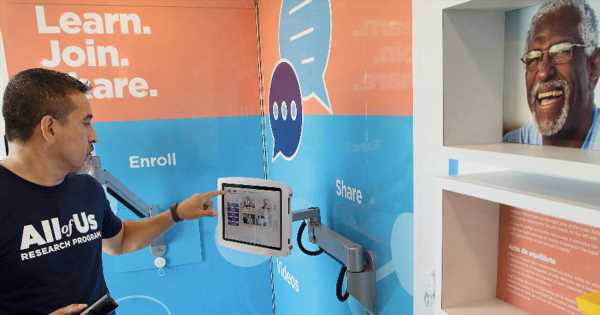As part of its All of Us Research Program, the National Institute of Health will issue reports informing study participants if they have increased risks for certain health conditions – and givign them pharmacogenetic information that can indicate how their bodies might pocess certain medications.
Color Health has partnered with NIH to offer no-cost follow-up clinical DNA tests for those who request and receive results with pathogenic or likely pathogenic variants.
WHY IT MATTERS
Precision medicine seeks to individualize medical care by first understanding a person’s biological risk factors, as well as the way they respond to medications and treatments.
NIH says that in the first phase of returning health-related DNA results, All of Us participants who provided a blood sample and consented to receive genomic information are being invited to receive their results indivudally.
Participants can choose which health-related results they want, if any. Then, the results they choose to receive will be processed and made available to them “several weeks later.”
The program anticipates that 2-3% of participants will receive a result showing a pathogenic or likely pathogenic variant linked in one of the genes included in their Hereditary Disease Risk report.
The report could link a participant to one or more of 59 genes and variants that are associated with serious, medically-actionable health conditions, including cancers, heart conditions, blood disorders and more.
Color Health will provide no-cost genetic counseling services to All of Us participants and their family members and healthcare providers to discuss and interpret their results, according to the announcement.
Participants can also choose to receive the results of the Medicine and Your DNA report, including seven genes that are known to affect how the body processes certain medicines.
Those whose results show they may have an increased risk of a serious health condition will be offered a clinical DNA test through the program’s genetic counseling resource, conducted outside of the program at no cost. Color will also provide the free clinical DNA tests.
NIH says reporting back to the genomic study participants can help advance health equity and can serve as a catalyst for change that increases representation in medical research.
“Our participants care about their health as well as medical research,” said NIH’s Karriem Watson, the chief engagement officer of the All of Us Research Program.
“We strive to share information with them in a responsible, accessible and impactful way that honors their trust in us and provides them with tools to continue to learn more about their own health,” he said.
THE LARGER TREND
Ambitious genomics projects are becoming more common. In addition to the NIH, organizations like Mount Sinai Health are launching genome sequencing projects involving their patients.
The Million Health Discoveries Program announced a few months ago seeks to sequence and analyze DNA from 1 million Mount Sinai patients and link anonymized versions of their electronic health records for a personalized medecine study by the Icahn School of Medicine.
Integrating personalized medicine into primary care helps drive value in patient care, according to early adopters asked about best practices for implementing precision medicine.
Three years ago, Northshore University HealthSystem in partnership with Color was able to advance their personalized medicine program at scale through a DNA program available to 10,000 eligible patients, said Dr. Peter Hulick, medical director of the Mark R. Neaman Center for Personalized Medicine at NorthShore.
It was one of the largest U.S.-based genomics efforts grounded in primary care at that time.
“The Color platform is designed to specifically explore genetic information on multiple cancers – including breast, ovarian, uterine, colon, melanoma, pancreatic, gastric and prostate cancers – genetic forms of heart disease and pharmacogenomics to inform metabolization of medications,” Hulick told Healthcare IT News.
ON THE RECORD
“Returning information in research programs is the ethical choice, but must be done responsibly and equitably,” Dr. Alicia Zhou, chief science officer of Color Health, said in the statement.
“All of Us is setting a new precedent for longitudinal research programs,” she added.
“Knowledge is powerful. By returning health-related DNA information to participants, we are changing the research paradigm, turning it into a two-way street – fueling both scientific and personal discovery that could help individuals navigate their own health,” said Dr. Josh Denny, chief executive officer of the All of Us Research Program,.
“This type of partnership with our participants is crucial for building trust and fulfilling the commitment we made to drive research that can offer meaningful insights for all.”
Andrea Fox is senior editor of Healthcare IT News.
Email: [email protected]
Healthcare IT News is a HIMSS publication.
Source: Read Full Article
